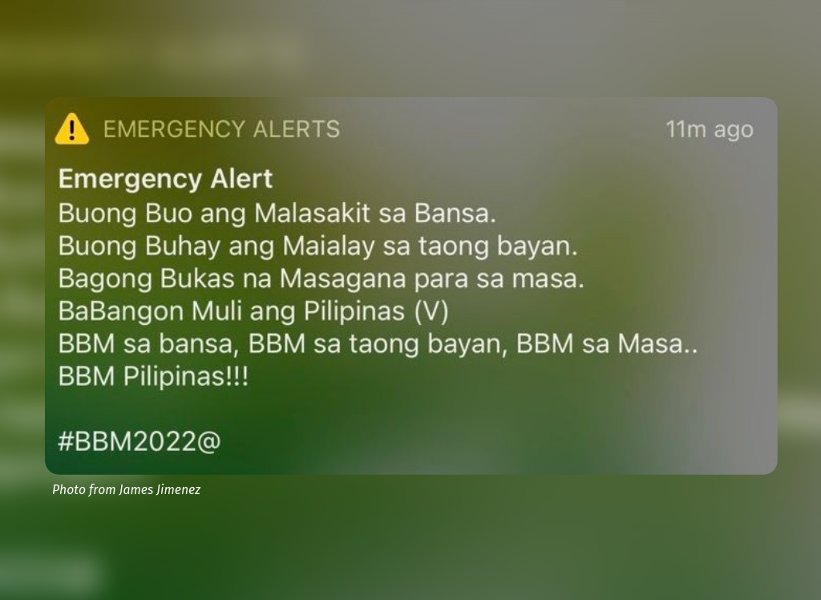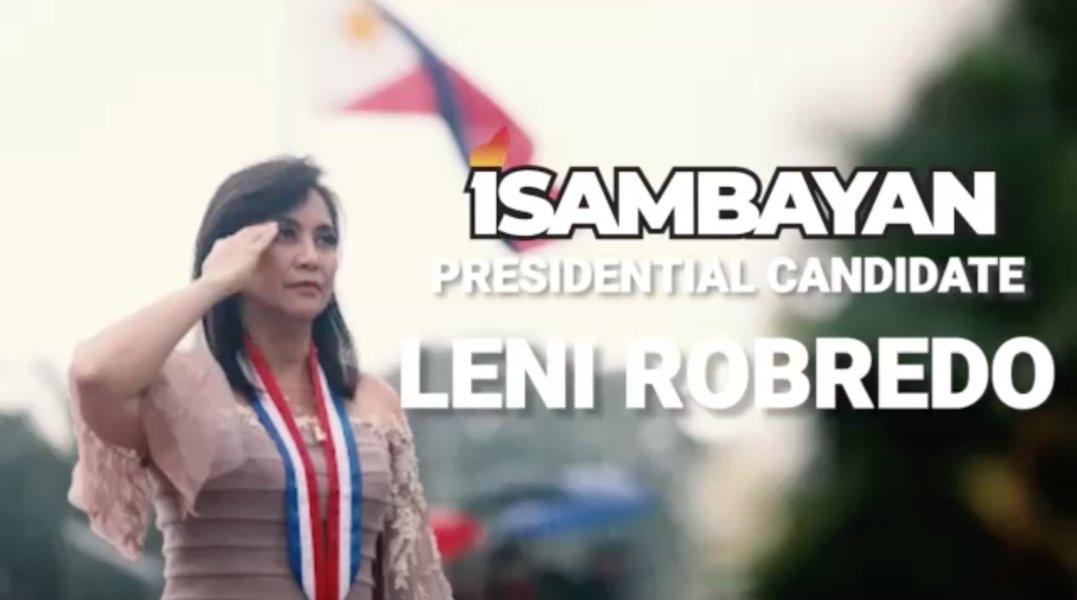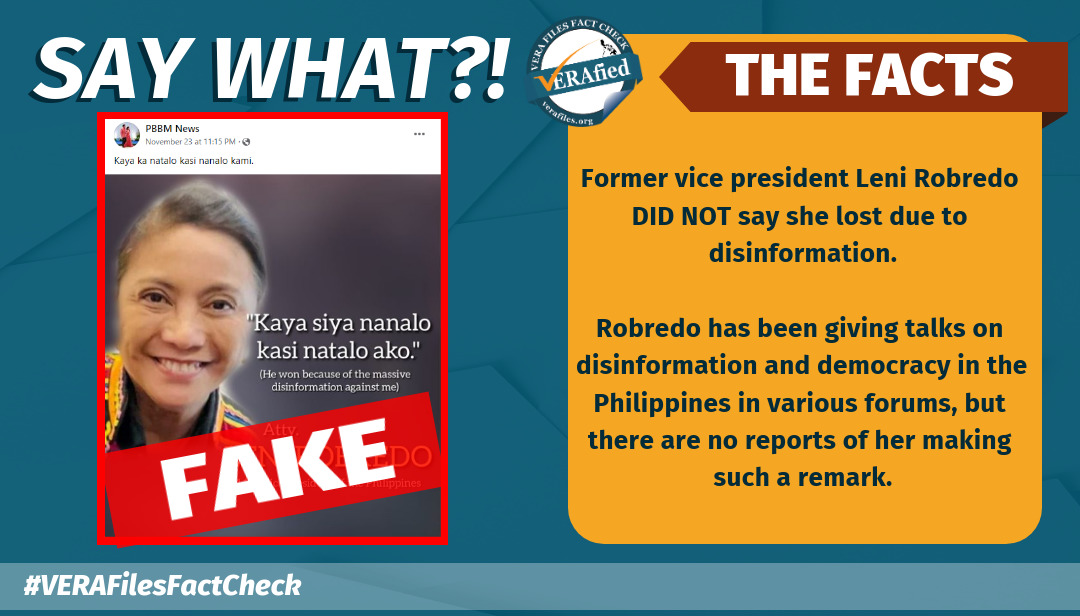(UPDATED) Several emergency mobile alerts from an unknown sender carrying a campaign message of Ferdinand “Bongbong” Marcos Jr. were spread around Wednesday as he filed his certificate of candidacy (COC) for president in the 2022 national elections.
Tagged as a “severe” emergency alert, it read:
Buong Buo ang Malasakit sa Bansa.
Buong Buhay ang Maialay sa taong bayan.
Bagong bukas na Masagana para sa masa.
Babangon muli ang pilipinas (V)
BBM sa bansa, BBM sa tayong bayan, BBM sa Masa..
BBM Pilipinas!!!
#BBM2022
Mark Timbal, officer-in-charge of the Office of Civil Defense (OCD) Public Affairs, confirmed that they had received information about the alleged emergency warning but denied that it came from the National Disaster Risk Reduction Management Council (NDRRMC).
He said that the only emergency notifications released by the NDRRMC, which is under the OCD, on Wednesday were about rainfall warnings about the current weather disturbance.
“We have received info about an alleged emergency warning received by certain people in a particular location about a certain personality. We wish to clarify that the NDRRMC does not issue this type of message for distribution to the public through our Telco partners, “ Timbal said in a statement.
James Jimenez, spokesperson of the Commission on Elections (COMELEC), said that although electoral laws do not specifically penalize this mode of political campaigning, the practice is “ill advised.”
“[T]he use of the emergency alert system for political propaganda purposes is ill-advised, at best. Whether or not criminal liability will attach to those who are behind this move will have to be determined by the appropriate agencies of government,” he said.
VERA Files reached out to the public relations office of Marcos but has yet to receive a response.
Republic Act (R.A.) 10639, or the Free Mobile Disaster Alerts Law, requires that “warning messages must be hazard-specific, time-bound and area-specific,” according to Timbal, who is also the spokesperson of NDRRMC.
“Emergency notifications issued today by the NDRRMC are only about rainfall warnings due to the current weather disturbance and nothing else,” he added.
Under the implementing rules and regulations (IRR) of R.A. 10639, dated July 21, 2015, emergency alert and warning messages can only come from the NDRRMC operations center.
The NDRRMC and the National Telecommunications Commission (NTC) have sole responsibility for the control, regulation, and management of alerts, which cover “up-to-date information, contact information of local government units and other agencies required to respond to the situation.”
Other relevant information could include evacuation centers, relief sites and pick-up points, storm warnings, tsunami alerts, evacuation directives, and instructions related to disaster management services.
“We are consulting with our TELCO counterparts about this incident and so far, they have informed us that such a message did not come from them,” Timbal said.
An ABS-CBN report quoted the NTC as saying that the controversial emergency message “probably came from portable cell sites illegally operated” but stressed that this was still under investigation by its regulation branch.
In the IRR, only the following agencies can provide the warning messages:
- Philippine Institute of Volcanology and Seismology (PHIVOLCS)
- Philippine Atmospheric Geophysical, Astronomical Services Administration (PAGASA)
- Philippine Nuclear Research Institute (PNRI)
- Mines and GeoSciences Bureau (MGB)
- Bureau of Fire Protection (BFP)
- Philippine National Police (PNP)
- Armed Forces of the Philippines (AFP)
- Department of Health (DOH)
- Philippine Information Agency (PIA)
- Presidential Communications Operations Office (PCOO)
Anyone who gives “false or misleading data or information or willfully through gross negligence, conceals or falsifies a material fact” may be sentenced to two to six months in prison and required to pay a fine up to P10,000, as stated in the IRR.
Asked if the said message, which was labeled as a “severe” emergency alert, counts as a violation, Timbal told VERA Files in a text message that, “it is possible but we will refer this to the relevant regulatory bodies.”
Marcos, only son and namesake of the late dictator Ferdinand Marcos, filed his candidacy for the highest government post in the country under Partido Federal ng Pilipinas (PFP).
In 2016, he lost his vice presidential bid to Leni Robredo but filed an unsuccessful protest to challenge the election results.
UPDATE: On the evening of Oct. 6, Victor Rodriguez, Marcos’ chief of staff, told VERA Files in a text message that they “support the swift action of the NTC calling for an investigation of the illegal use of the emergency alert notification text containing pro-Bongbong Marcos narratives.” He denied that Marcos’ campaign team had anything to do with these alerts.
He added:
“We should not tolerate underhanded moves to trivialize this tool meant to forewarn the Filipinos of an impending, actual or post disaster event or scenario.
We hope that the responsible parties do not interfere with government systems just to operate political sabotage against presidential aspirant Ferdinand ‘Bongbong’ Marcos.”




